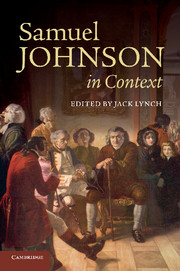Book contents
- Frontmatter
- Contents
- Illustrations
- Contributors
- Preface
- Chronology
- Abbreviations
- Part I Life and works
- Part II Critical fortunes
- Part III Contexts
- Chapter 10 America
- Chapter 11 Anglicanism
- Chapter 12 Anthropology
- Chapter 13 Authorship
- Chapter 14 Biography
- Chapter 15 Book trade
- Chapter 16 Clubs
- Chapter 17 Conversation
- Chapter 18 Dictionaries
- Chapter 19 Domestic life
- Chapter 20 Education
- Chapter 21 Empire
- Chapter 22 Essays
- Chapter 23 Fiction
- Chapter 24 History
- Chapter 25 Journalism
- Chapter 26 Law
- Chapter 27 Literary criticism
- Chapter 28 London
- Chapter 29 Medicine
- Chapter 30 Mental health
- Chapter 31 Money
- Chapter 32 Nationalism
- Chapter 33 Philosophy
- Chapter 34 Poetry
- Chapter 35 Politics
- Chapter 36 Scholarship
- Chapter 37 Science and technology
- Chapter 38 Scotland
- Chapter 39 Sermons
- Chapter 40 Shakespeare
- Chapter 41 Slavery and abolition
- Chapter 42 Social hierarchy
- Chapter 43 Theatre
- Chapter 44 Travel
- Chapter 45 Visual arts
- Chapter 46 War
- Chapter 47 Women writers
- Further reading
- Index
- References
Chapter 25 - Journalism
from Part III - Contexts
Published online by Cambridge University Press: 05 June 2012
- Frontmatter
- Contents
- Illustrations
- Contributors
- Preface
- Chronology
- Abbreviations
- Part I Life and works
- Part II Critical fortunes
- Part III Contexts
- Chapter 10 America
- Chapter 11 Anglicanism
- Chapter 12 Anthropology
- Chapter 13 Authorship
- Chapter 14 Biography
- Chapter 15 Book trade
- Chapter 16 Clubs
- Chapter 17 Conversation
- Chapter 18 Dictionaries
- Chapter 19 Domestic life
- Chapter 20 Education
- Chapter 21 Empire
- Chapter 22 Essays
- Chapter 23 Fiction
- Chapter 24 History
- Chapter 25 Journalism
- Chapter 26 Law
- Chapter 27 Literary criticism
- Chapter 28 London
- Chapter 29 Medicine
- Chapter 30 Mental health
- Chapter 31 Money
- Chapter 32 Nationalism
- Chapter 33 Philosophy
- Chapter 34 Poetry
- Chapter 35 Politics
- Chapter 36 Scholarship
- Chapter 37 Science and technology
- Chapter 38 Scotland
- Chapter 39 Sermons
- Chapter 40 Shakespeare
- Chapter 41 Slavery and abolition
- Chapter 42 Social hierarchy
- Chapter 43 Theatre
- Chapter 44 Travel
- Chapter 45 Visual arts
- Chapter 46 War
- Chapter 47 Women writers
- Further reading
- Index
- References
Summary
NEWS. n.s. without the singular. [from new, nouvelles, Fr.]
2. Papers which give an account of the transactions of the present times.
Their papers, filled with a different party spirit, divide the people into different sentiments, who generally consider rather the principles than the truth of the news-writer. Addis.
In 1709, the year in which Samuel Johnson was born, London saw its first daily evening newspaper, the Evening Post, and Richard Steele began writing the Tatler. In these two periodicals from the same year, we have two different forms or genres – the newspaper and the literary essay. Although Johnson was born in Staffordshire, far from London, he would of course move to London and write for periodicals, and these two publications highlight one particularly important aspect of the impact of print on Johnson, while also pointing to tensions that animate Johnson’s contributions to journalism.
By the early eighteenth century, periodicals such as the Evening Post had begun to compile a variety of different stories in the same publication, paving the way for the format that would become so prevalent in the nineteenth and twentieth centuries: newspapers providing daily updates on current events, across a wide range of fields, creating in the process, among other things, a narrative played out on what has come to be called the twenty-four-hour news cycle. On the other hand, with publications such as the Tatler, the eighteenth century began to see the development of the single-essay literary periodical. Typically published a couple of times a week, these journals might sustain a topic or a theme across a few issues. Usually, though, each prose essay offered anecdotal observations; what was sustained across them, instead of the narrative of the news, was the character created by the typically anonymous author of the journals’ reflections.
- Type
- Chapter
- Information
- Samuel Johnson in Context , pp. 216 - 224Publisher: Cambridge University PressPrint publication year: 2011



